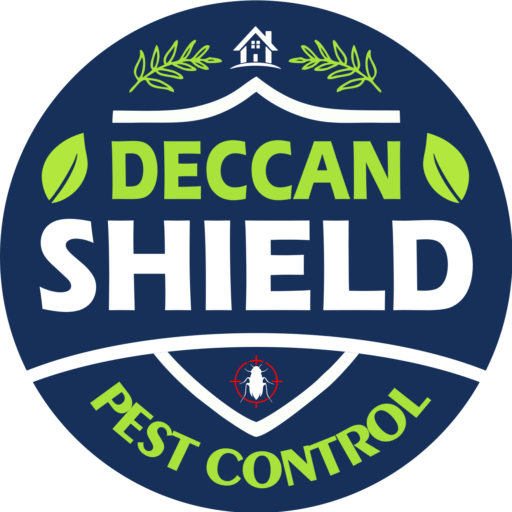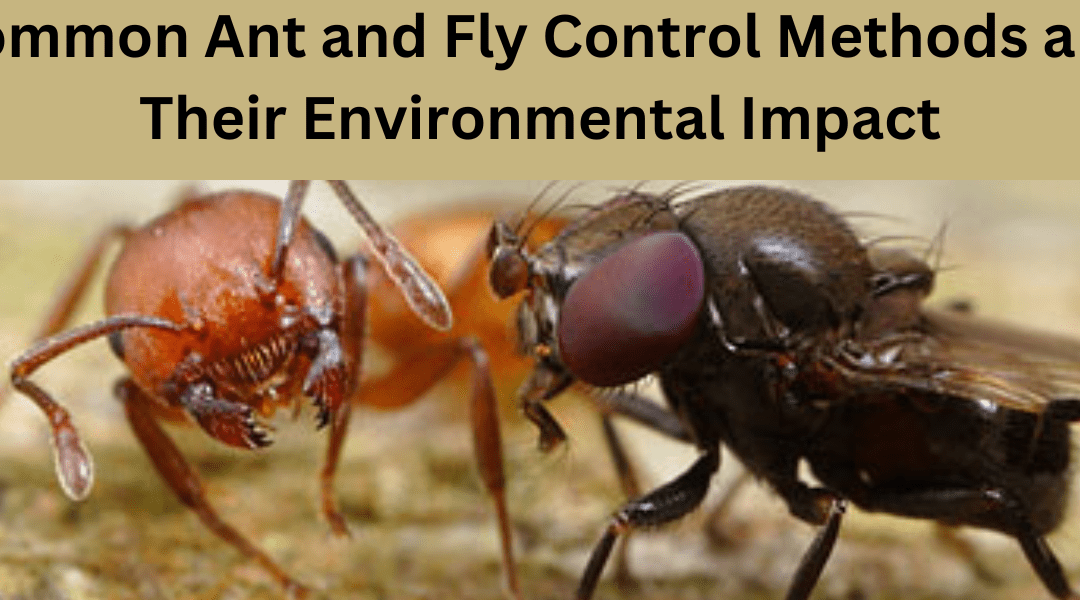Different ants and fly control methods are used to tackle ant and fly infestations, ranging from chemical solutions to natural approaches. Let’s look at how these methods impact the environment.
Chemical Insecticides
Chemical insecticides are one of the most commonly used methods for controlling ants and flies. They are fast-acting and can eliminate large infestations quickly. However, they also come with significant environmental drawbacks.
- Impact on Non-Target Species: Chemical insecticides don’t only target pests like ants and flies. They can also harm beneficial insects such as bees, butterflies, and other pollinators that play an important role in maintaining biodiversity. When these chemicals are used in outdoor spaces, they can affect non-target species and disrupt ecosystems.
- Water Contamination: Runoff from chemical treatments can enter water sources such as rivers, lakes, and groundwater. This can lead to the contamination of drinking water and harm aquatic life, causing imbalances in ecosystems.
- Soil Health: Repeated use of chemical insecticides can affect soil health, killing beneficial microorganisms and leading to reduced soil fertility over time. This can negatively impact plants and animals that rely on healthy soil.
Natural and Eco-Friendly Alternatives
In response to the growing concern over chemical insecticides, many pest control companies, including Deccan Shield Pest Control, now offer more environmentally friendly alternatives. These methods aim to reduce harm to non-target species and ecosystems while still effectively managing pest populations.
- Biological Control: One eco-friendly method is using biological control agents, such as predators, parasitoids, or pathogens that naturally target ants and flies. For example, certain types of nematodes can control ants in gardens, while parasitic wasps are known to reduce fly populations. These methods are more selective and cause minimal disruption to the environment.
- Organic Insecticides: Organic insecticides are made from natural ingredients such as neem oil, diatomaceous earth, or essential oils. These substances break down more quickly in the environment and have a lower risk of harming non-target species. However, they may need to be reapplied more frequently than chemical insecticides.
- Physical Barriers and Traps: For both ants and flies, traps and physical barriers can be an effective control method. Sticky traps, fly zappers, and ant baits placed strategically around the home can help manage populations without the need for harsh chemicals. Additionally, sealing cracks, using screens on windows, and proper sanitation can go a long way in preventing infestations.
How Deccan Shield Pest Control Practices Eco-Friendly Pest Control
At Deccan Shield Pest Control, we understand the importance of protecting both your home and the environment. That’s why we’re committed to using pest control methods that are not only effective but also safe for the environment. Our approach to ant and fly control focuses on minimizing the environmental impact while ensuring your home is free from these pesky intruders.
- Integrated Pest Management (IPM)
Our pest control strategies are based on Integrated Pest Management (IPM), a holistic approach that combines multiple methods to control pests effectively and sustainably. We assess each situation carefully and recommend a tailored solution that fits your needs without harming the environment.
- Prevention First: Rather than relying solely on chemicals, we prioritize prevention. This includes identifying potential entry points for ants and flies, advising on sanitation practices, and implementing physical barriers.
- Targeted Treatments: When treatment is necessary, we use the most targeted and eco-friendly solutions available. Whether it’s an organic insecticide or a biological control agent, we ensure that the method used has minimal environmental impact while effectively managing the pest population.
- Minimizing Chemical Use
At Deccan Shield Pest Control, we recognize that chemical treatments should be a last resort. By minimizing chemical use and focusing on non-toxic methods, we reduce the risk of harming the environment, pets, and people.
- Safe for Children and Pets
One of the concerns when using pesticides is the safety of children and pets in the home. We ensure that all of our treatments are safe for your loved ones, using non-toxic and environmentally friendly options whenever possible. Our team will also provide guidance on how to keep your home pest-free using safe and sustainable practices.
If you’re searching for Ant and Fly control services near me or Ant and Fly control services in Hyderabad, trust Deccan Shield Pest Control to provide safe and eco-friendly solutions.
Steps You Can Take to Reduce Environmental Impact
As a homeowner or business owner, there are steps you can take to reduce the environmental impact of pest control methods while keeping your property free of ants and flies.
- Proper Waste Management: Flies are attracted to garbage, while ants seek out food crumbs and spills. By ensuring proper waste disposal and cleanliness, you can reduce the chances of attracting these pests in the first place.
- Natural Repellents: Essential oils such as peppermint, eucalyptus, and tea tree oil are known to repel both ants and flies. Using these oils in problem areas can be an eco-friendly way to deter pests.
- Limit Chemical Use: If you need to use pesticides, choose products that are labeled as eco-friendly or organic. Always follow the instructions carefully to avoid overuse, and avoid applying chemicals near water sources or areas where non-target species are present.
- Consult Professionals: The best way to ensure that your pest control methods are environmentally friendly is by consulting with professionals like Deccan Shield Pest Control. We can recommend the safest and most effective options for your specific situation.
Conclusion
Ant and fly control methods is necessary to maintain a healthy and safe home environment, but it’s important to consider the environmental impact of the methods used. Chemical insecticides, while effective, can harm non-target species, contaminate water, and degrade soil health. Fortunately, there are many eco-friendly alternatives available, from biological control to organic insecticides.
At Deccan Shield Pest Control, we are dedicated to providing effective Ant and Fly control services that are environmentally responsible. Whether you’re looking for Ant and Fly control services in Hyderabad or searching for Ant and Fly control services near me, you can trust us to protect your home and the environment.
Contact us today to learn more about our eco-friendly pest control solutions and how we can help you keep your home free from ants and flies in a way that’s safe for both your family and the planet.

